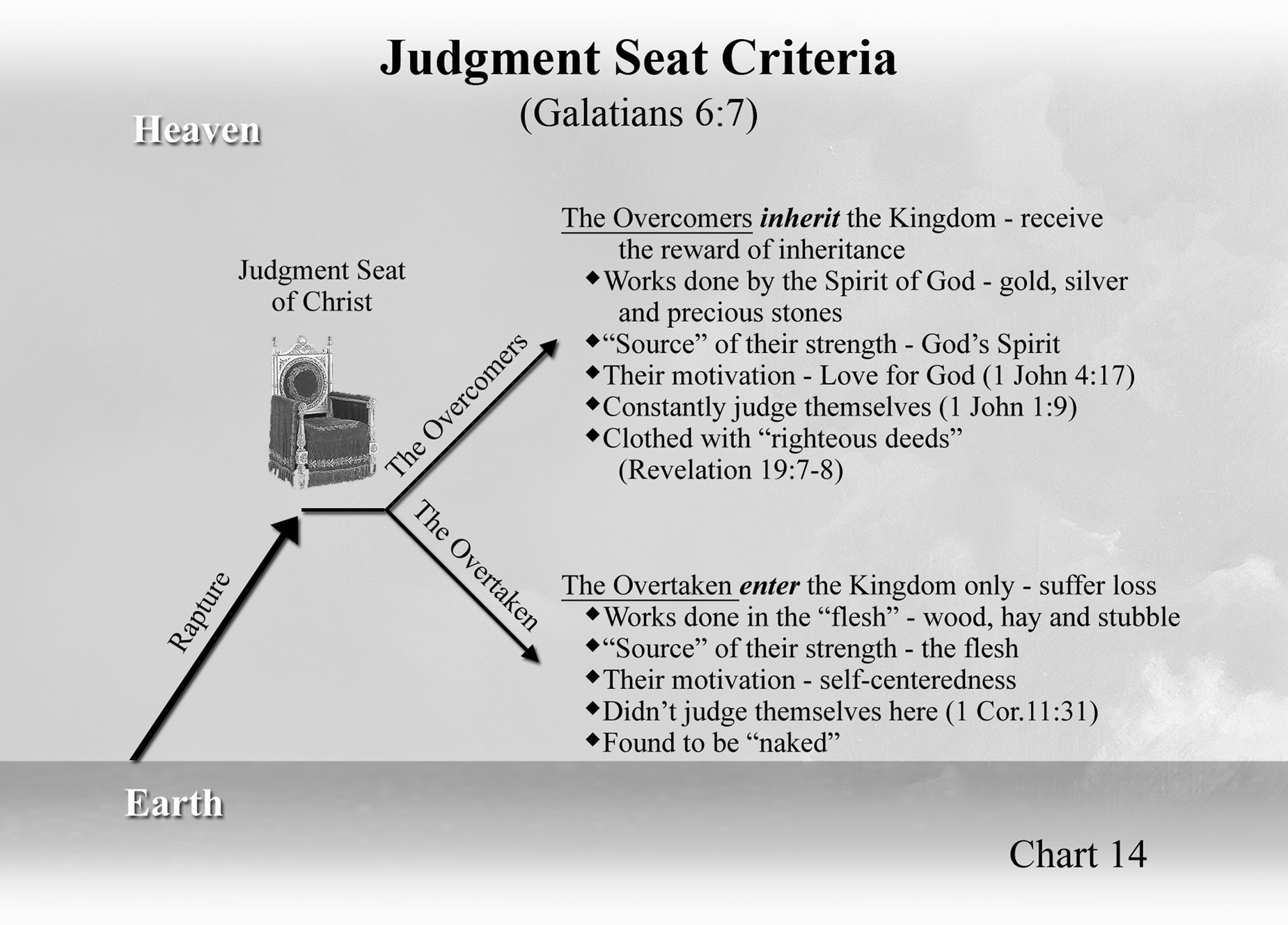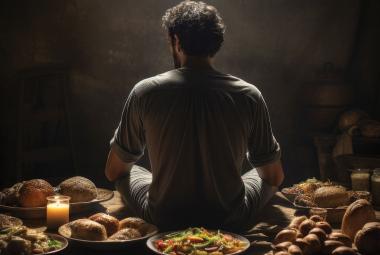Last month, we began to explore what exactly happens after the Rapture. The first event to occur is the Tribulation here on the earth and, at the same time, the Bema Seat Judgment in heaven. 2 Corinthians 5:10 tells us that all Christians must appear before Christ at this judgment to receive a review of all the things they have done in their bodies, “whether it be good or bad.” The outcome of this judgment will determine their place, their role, their status and their position in the coming Millennial Kingdom.
The Bible tells us that at least five books will be opened at this Bema Seat Judgment: the Book of the Living (Psalm 69:28); the Lamb’s Book of Life (Revelation 3:5; 13:8; 20:12); the Book of Tears (Psalm 56:8; 2 Kings 20:5); the Book of Deeds (Daniel 7:10); and the Book of Remembrance (Malachi 3:16).
Notice, by the way, there are two “books of life.” These are the books that Christ will use in order to judge our lives fairly (Exodus 32:32–33; Psalm 139:16) because they will tell the ab-solute truth about our lives. They will reveal our motives, our doctrine, our works, our stewardship, our service, our account-ability, and our sanctification. Each of these areas will be scrutinized.
Matthew 10:26–27 even suggests that this judgment might be visible. In other words, all will see and all will know the outcome. It says everything that is covered and hidden now will be revealed and out in the open there (Luke 12:2–3).
The Quality of Material
The Bema Seat Judgment is the time when we will be judged as to the quality of materials that we have used to build our lives here on earth. Our foundation must always be Christ: “For [no] other foundation can man lay than that is [which is] laid, which is Jesus Christ” (1 Corinthians 3:11). The additional building materials (“our works, our deeds, our fruit, and our actions”) will either be “works of the flesh” or “works of the spirit”: “Now if any man build upon this foundation [Christ] gold, silver, precious stones [will result], [If not], wood, hay, stubble [will result]” (1 Corinthians 3:12). “Every man’s work shall be made manifest: for the day shall declare it, because it shall be revealed by fire; and the fire shall try every man’s work of what sort it is [Spirit-led or fleshly]” (1 Corinthians 3:13).
This is saying that only one set of building materials will withstand the fire; any other material will feed the fire. Any work or fruit that survives the fire of judgment will be re-warded. Any work that burns in the fire will be considered a loss.
The test will be conducted as a “baptism of fire.” (The Greek word for test is dokimazo, which means “testing someone to see if they pass the exam; to see if they may be approved or sanctioned.”) Kenneth Wuest said in his book Word Studies in the Greek New Testament, “The word (testing) has in it the idea of proving a thing whether it’s ‘worthy’ (axios) or not to be received.”
John talked about this baptism by fire in Matthew 3:11 and Luke 3:16. Fire doesn’t cleanse us, it tries our works! It will test the superstructure of our lives—what we did with the gifts, the talents, and abilities that God gave us. What kind of righteous works did we do because of these abilities? The fleshly things will be burned and the spiritual things will be rewarded.
The foundation in each of our lives, if we are believers, must be Christ––already a “tried” stone. But the fire is going to test the superstructure we have added to that foundation. Every idle word, every secret, and every hidden motive will be exposed and tried. The Lord will look at our motives, our hidden secrets, our faithfulness, our words, and then He will test our deeds. “But I say unto you, that every idle word that men shall speak, they shall give account thereof in the day of judgment. For by thy words thou shalt be justified, and by thy words, thou shalt be condemned” (Matthew 12:36–37).
Thinking about the foundation that our works must be built upon reminds us of the story of the wise man in Matthew 7. When the storm came, his house did not fall because it was built upon the rock (Matthew 7:24–25). But the foolish man built his house upon the sand and when the rains came and the winds blew, it fell and it fell hard (Matthew 7:26–27). Christ must be the foundation and the source of everything we do! Otherwise our house will fall, not only in this lifetime, but in the next as well.
Confidence at the Judgment Seat
The believers who have “built their houses upon the Rock” are those who are experientially sanctified, partakers of Christ’s Life, and have produced fruit in their lives. They can have confidence and boldness on that day of judgment because they have already judged themselves through prayer and have already recognized their sin and dealt with it (1 John 4:17). Thus, their works will be “gold, silver, precious stones.” If they have not made proper judgment of themselves here (have not applied 1 John 1:9) and their lives have not produced righteous works, then God will be forced to make that judgment for them there. (1 Corinthians 11:31).
If love for God has been our motive here, then we can have confidence there; if it has not, we have reason to be concerned. Loving God does not refer to an emotional feeling of love for Him, but a total state of yieldedness to Him.
The bottom line is that all judgment at the Bema Seat will be on the basis of works, either fleshly works or spiritual works. “The Son of man shall come in the glory of His Father with His angels; and then He shall reward every man according to his works” (Matthew 16:27. See also 1 Corinthians 3:12–15; 2 Corinthians 5:10).
The result of this judgment either will be to receive the “re-ward of inheritance” (Colossians 3:24) or to “suffer loss” and eventually be separated from the joy of His fellowship. Un-faithful Christians whose works are burned will be found spiritually naked and ashamed, but can be certain that even this nakedness will not separate them from God’s Love (Romans 8:35–39).
Only What’s Done for Christ Will Last
Paul Benware in his great book The Believer’s Payday said: “We can be sure that at the Judgment Seat of Christ there will be a marked difference between the Christian who has lived his life before the Lord, clearly discerning what was for His glory, and a nominal Christian. All will be in heaven, but the differences between them will be eternal. We may be sure that the consequences of our character will survive the grave and that we shall face those consequences at the Judgment Seat of Christ.”
And Steve Lawson in his book Heaven Help Us said: “One life to live will soon be past. Only what’s done for Christ will last!” Every Christian’s position in the Millennial Kingdom will be determined at the Bema Seat. There will be a marked difference—varying degrees of glory—between the nominal Christian and the spiritual Christian.
God will faithfully reward those who have sought Him with all their hearts and also recompense those who have left their first love.
“In a great house there are not only vessels of gold and of silver, but also of wood and of earth; and some to honour, and some to dishonour” (2 Timothy 2:20).
Gold symbolizes sovereignty and eternal things; wood symbolizes earthly and temporal things. In this Scripture believers are likened to vessels in a great house. Some will be there to honour, and some to dishonour. The idea is that in the Millennium we should not presume that we will all be alike. We won’t be. It doesn’t stand to reason that Paul the apostle, who labored more than many of the others, would receive the same degree of glory or responsibility as the thief on the cross who was saved only one hour before he died.
At the Bema Seat, believers will find out exactly where they will be for the next thousand years. Will they enter the Millennial Kingdom but not receive an “inheritance from the Lord”? Or will they be sovereigns (inheritors) there and receive positions of authority and responsibility? The outcome will be on the basis of their faithfulness, sanctification, and obedience. There will be no equality. All will be “in the kingdom,” but some will occupy positions of honor and glory, while others will miss out on positions of responsibility altogether.

Each of us will “reap what we have sown” at the Bema Seat (Galatians 6:7). The Lord will use the following criteria to judge us: Were our works done by the power of His Spirit or were they done in the flesh? In other words, what was the source of our strength and who actually produced the work in our lives?
Our labor—our works of righteousness—must be motivated by His Life in our hearts and then produced in our lives by His ability and His power, not our own (John 3:21). If this is the case, then we will be “clothed with righteous deeds” (Revelation 19:8). Whereas, if the flesh is the source of our works, then we will produce unfruitful works and be found naked (See Revelation 3:17; 16:15).
“Good Works”
Whenever you mention doing good works, it seems to send shivers down some people’s backs. Why is that? It’s simple. Many Christians get “justification,” which is a free gift from God and requires no works at all, mixed up with experiential “sanctification,” which results in doing good works by the power of God’s Spirit. “We are His workmanship, created in Christ Jesus unto good works, which God hath before ordained that we should walk in them” (Ephesians 2:10).
If our “works” are prompted by the Holy Spirit and then performed by Him (even though no one else sees), those works will withstand the fire at the Bema Seat and the believer will be rewarded. “If any man’s work abide which he hath built there-upon, he shall receive a reward” (1 Corinthians 3:14; see also Revelation 22:12).
If, however, our works are done with the self-centered motive of being seen by men and applauded by them, then that becomes its own reward. There will be none other (Matthew 6:1).
The bottom line is: in order to have “confidence” at the Judgment Seat of Christ, Scripture tells us we must not only learn how to allow the Spirit of God to perform “good works” in our lives, but we must also learn how to allow Christ to “conform us into His image.” Then, our Love (which is really His Love) will be made perfect and complete through us. (1 John 4:17)
To be continued: “Different Facets of God’s Rewards.” This article has been excerpted, in part, from Chuck and Nan’s new book The Kingdom, Power and Glory.




